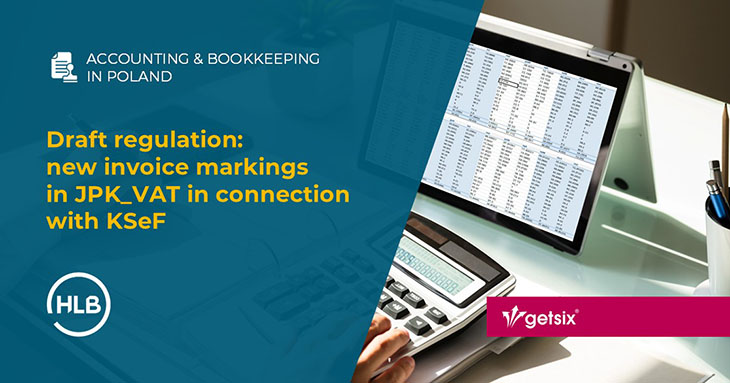Legal requirements
Value Added Tax (VAT)
The Polish Act of 11 March 2004 on Value Added Tax (VAT) together with its implementing acts regulate Value Added Tax. The Act lays down the fiscal requirements concerning goods and services.
Scope of Taxation
The following are subject to VAT: chargeable delivery of goods and provision of services in Poland, export of goods, import of goods, intra-Community acquisition of goods for remuneration in Poland, and intra-Community delivery of goods.
Tax base
As a rule, the taxable base is the turnover, i.e. the amount due for the sale, reduced by the amount of VAT on that sale.
Taxable persons
Taxpayers are natural persons, legal entities and organizational units without legal personality (e.g. civil partnership, general partnership, partner company, etc.), who independently carry out business activity, regardless of the purpose or result of such activity.
VAT rates
There are several VAT rates in Poland, the application of which depends on the type of sale. Currently, the basic VAT rate in Poland is 23% and it applies to most sales.
There are also reduced VAT rates available, which are:
- 0% - preferential rate, primarily applied in intra-Community supply of goods and export of goods.
- 5% - reduced rate, e.g. basic food products, books, specialist magazines,
- 8% - reduced rate, e.g. some processed food products, goods connected with agricultural production, health care, services connected with culture, sport, recreation, household services, passenger transport, supply, construction, renovation, modernization, thermomodernization or reconstruction of buildings.
Income tax
Income tax as applicable to businesses is regulated by the following acts:
- Corporate Income Tax Act of 15 February 1992;
- Personal Income Tax Act of 26 July 1991;
- Law on Lump Sum Income Tax of 20 November 1998 on Certain Income Earned by Individuals.
Taxpayers
Corporate income tax (CIT) is paid by:
- legal persons;
- Organizational units without legal personality;
- capital companies in organization,
- limited partnerships and limited joint-stock partnerships which have their registered office in Poland,
- general partnerships that have their registered office in Poland, if the partners of the general partnership are not exclusively natural persons and the general partnership does not file the specified information or its update with the appropriate head of the tax office,
- tax capital groups,
- unincorporated companies with their registered office or management board in another country, if, under the tax laws of that country, they are treated as legal entities and are subject to taxation in that country on their total income regardless of where it is earned.
Taxpayers with their registered office or management board in Poland are subject to CIT in Poland on their total income. Taxpayers that are legal entities pay tax only on income earned in Poland if their registered office or management board is not registered in Poland.
All natural persons, including partners in partnerships and private partnerships, pay personal income tax (PIT). Natural persons who are not resident in Poland are only subject to tax on income (revenues) obtained in Poland (limited tax obligation).
Revenues
Revenue is the total value from net sales of goods, merchandise and services. Revenues obtained in Poland are understood to mean revenues from:
- work performed in Poland on the basis of an employment relationship, service relationship or cooperative employment relationship, irrespective of the place where payment is made;
- activity performed personally in Poland irrespective of the place where payment is made;
- business activity carried out in Poland;
- real estate located in Poland, including sales of such real estate.
Income
Income is defined as revenue less tax deductible costs. Income earned by taxpayers with registered office or management in the territory of the Republic of Poland is subject to taxation regardless of where it is earned. If taxpayers do not have their registered office or management board within the territory of the Republic of Poland, they are subject to taxation only on income earned within the territory of the Republic of Poland.
In the case of corporate taxpayers whose registered office or board are not in Poland, when it is not possible to determine their income on the basis of accounting data, their income is estimated using an income index in relation to revenues, which is 5% for retail and wholesale trade and 10% for construction, assembly, and transport services.
Tax rates
CIT rates:
- 19% tax base,
- 9% of the tax base on income (revenue) other than capital gains for small taxpayers and start-ups.
Other taxes
In some cases, businesses are required to pay other taxes and local fees, which are a source of revenue for local authorities. In the case of taxes on property and means of transport, local authorities have the right to set rates and the relevant relief for these taxes, including tax relief that are part of programmes supporting businesses.
Information about current tax rates and relief in a given location can be found on the websites of the relevant local authorities.
Property tax
The Local Taxes and Fees Act of 12 January 1991 governs property tax.
Tax on means of transport
The tax levied on means of transport is also governed by the Local Taxes and Fees Act.
Tax on civil law transactions
Tax on civil law transactions is governed by the Tax on Civil Law Transactions Act of 9 September 2000.
Administrative procedures
Submission of tax returns
Companies can submit VAT and tax declarations electronically. This option is open to those companies that have an qualified, electronic, trusted or personal signature. Please note that each type of declaration can only be signed with the signatures indicated for that declaration. Electronic declarations can be submitted using the appropriate forms.
Deadlines
Taxpayers do not have to submit income tax returns during the tax year in which they are obliged to pay tax advances.
Taxpayers who are legal persons must submit tax returns stating the level of income (or loss) achieved in a tax year by the end of the third month of the next year. Within this period, they must also pay tax due or the difference between the tax due on the income as indicated in their tax return and the tax advances from the beginning of the year.
Taxpayers who are natural persons must submit tax returns for a given tax year by 30 April of the next year. For taxpayers who pay tax in the form of a lump-sum calculated on recorded revenue the deadline is 31 January of the next year.
Systems of paying income tax advances
Taxpayers pay advances monthly; small taxpayers and taxpayers who start a business can pay quarterly advances. During the tax year, taxpayers can take advantage of a simplified system of paying tax advances based on monthly payments of 1/12 of the amount of tax due.
Tax arrears
Taxes that are not paid by the deadline become tax arrears, on which statutory interest is charged from the first day after the payment deadline. When arrears are paid after the deadline, companies must calculate interest due and pay the tax arrears as well as the interest due.
The statutory interest rate currently (as of October 5, 2023 – valid for 2025) is:
- 14.5% of the amount of arrears per annum;
- 7.25% of the amount of arrears per annum - a reduced rate of interest on tax arrears;
- 21.75% of the amount owed per annum - increased rate of interest on tax arrears.
Appealing tax decisions
Tax proceedings are a two-instance process. Appeals against decisions of tax offices (tax authorities of first instance) can be lodged with directors of tax chambers. Second-instance rulings are final. Appeals against them can be lodged with administrative courts.


















